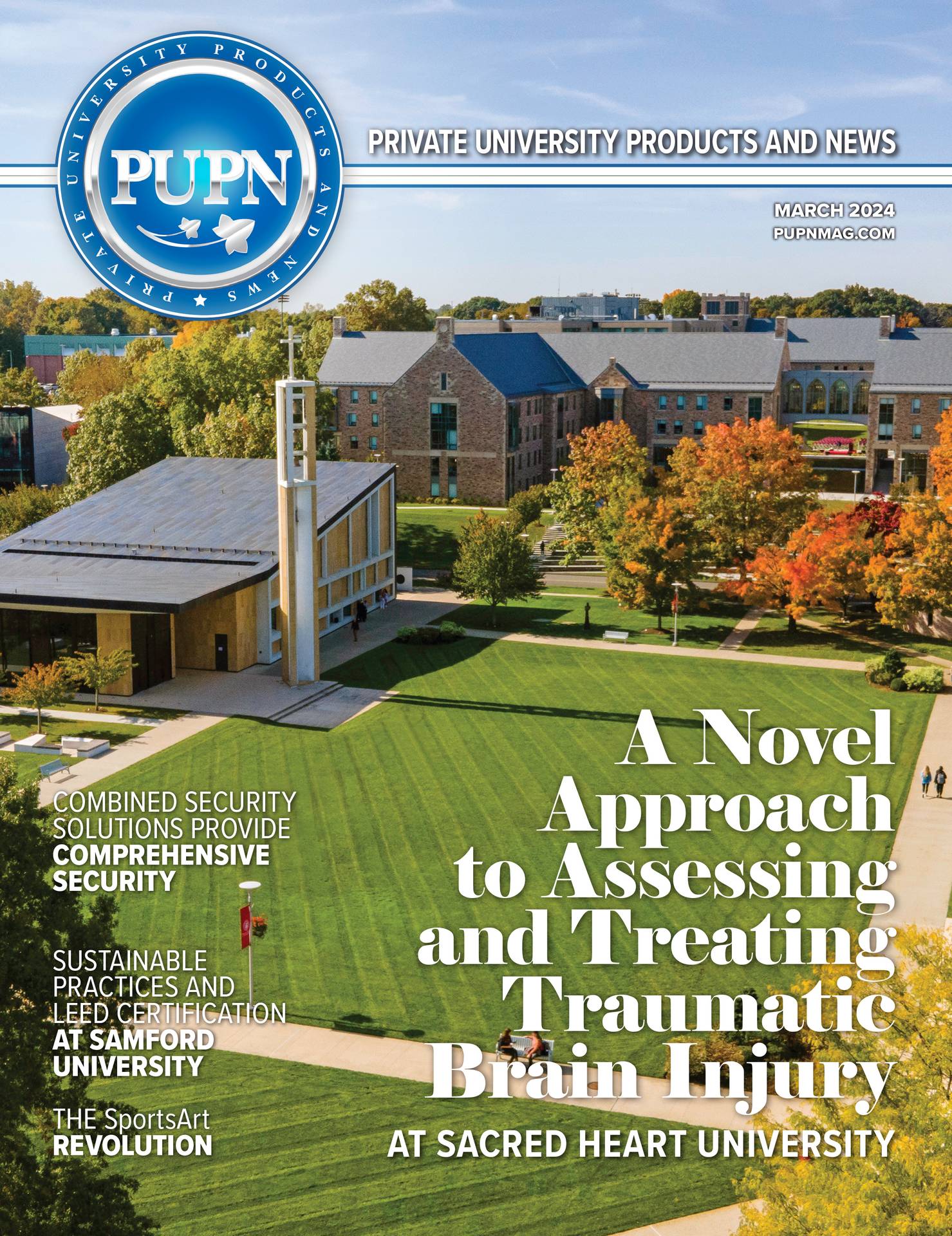As a graduate student, he taught calculus at University of Texas at Austin and received the 2012 Texas Exes Teaching Award. After finishing his PhD in Electrical and Computer Engineering, with research that focused on the mathematical modeling of renewable energy source and energy storage system, Dr. Song joined the faculty of John Brown University in Arkansas as an Assistant Professor of Engineering.
“Christ Over All”
At the center of all life at John Brown University, from classwork to athletics and residence hall life, is faith in Jesus. As such, worship takes place beyond the chapel services and pervades everything they seek to do on their campus, with everyone working together to serve others and glorify God.
The original motto, “Christ Over All with Head, Heart, and Hand,” unites them, and they focus on educating the whole student by holding to an interdenominational doctrinal position identified, in part, by the infallible word of God, the deity of Jesus Christ, the ministry of the Holy Spirit, and the spiritual unity of believers.
Along with the campus opportunities to connect with worship services, retreats, evangelism ministries and trips, chapel is also considered an integral part of the school’s mission. With twice-a-week meetings in the grand Cathedral of the Ozarks, students gather to hear Christian leaders from around the globe, and members of the JBU community, present chapel services designed to encourage others to live as Jesus’ disciples.
Christian Engineering
Fervently devoted to the university motto of “Christ Over All,” Song believes that having faculty members and staff who serve God and are called to serve others “really affects how we teach, study, and do research.” In the Engineering department, for instance, he explains that he seeks opportunities to “glorify God’s name” by working with communities that would most benefit from the prototypes and projects developed in his department. For instance, he recently earned an EPA grant to develop a water purification system in Guatemala. He notes that Christian engineers seek to “use skills to serve God and address problems around the world-not just in local communities but internationally.”
On his trips, he stresses that he is learning too. When Song accepted an invitation from a Guatemalan pastor in Guatemala, he wanted to make sure he could at least briefly communicate in Spanish, so he started auditing Spanish classes before the initial visit-which he still continues in his fourth semester with the class-including sharing a class with first-year students that he called his “study buddies,” as they worked together to practice their new language skills. Not only did he feel he learned from his fellow Spanish students, but he also appreciated the teaching style of his professor in the Spanish courses.
He found the classes to be different from many Engineering courses, “more interactive and encouraging more participation.” He ultimately borrowed pedagogical tools he was drawn to in the language courses, in order to enhance his own teaching in the Engineering department.
Assisting Students with Spiritual Struggles
Seeing his role as more than just an academic mentor to his students, Song also leads a regular Bible study, hoping to assist students who are experiencing spiritual struggles. Song adds that while he grew up in church, he realized as a young man that he “understood Christ intellectually” but that it was not a “real relationship.”
While he was in graduate school, he witnessed another’s testimonial. He shares, “After that testimonial, I evaluated my faith and realized I didn’t know God-I didn’t have a relationship with Him.” Even though he had been baptized at birth and been raised in a church, he suddenly realized he was missing a piece of that connection, and he “came to Christ.”
Because he so clearly remembers his own spiritual experience as a young student, his “hope and goal” is to serve those struggling students by drawing on his experiences. He adds that his colleagues have the same goal-a “work of the spirit” that allows them to be used as “a tool of righteousness on campus.” Song believes that work happens in quieter moments-in “walking with students,” rather than in a classroom where the norm is lecturing. He and his colleagues focus on how to connect with students with the goal to “better serve and glorify His name in daily life.”
Called to Teaching
Song first taught while working on his doctorate at the University of Texas. “Before then,” he adds, “I didn’t think about teaching at all.” Yet, while working with his UT students, he realized how much he enjoyed watching students grow, both academically and personally. With several opportunities to work with first-generation college students, Song also experienced firsthand the “pleasure of seeing a student improve dramatically.” From that point, he considered making teaching part of his career.
At JBU, he regularly takes his students to lunch giving them an opportunity to talk about things beyond the coursework. He notes they “talk about all sorts of things,” and he helps them in whatever way he can. Some may be struggling with studying, for example, so he focuses on explaining not just why studying is a necessary part of the college experience but also “why we want to study.” He adds, “If you don’t have the heart changed, it’s very hard for both the professor and the student.” Thus, his prayer is that, though “human beings cannot change hearts,” they can offer a positive impact on the students, as God works to change their hearts.
Working and Learning Together
Song believes he is only one part of a much larger effort going on at JBU. He stresses, “There are so many others that are doing better jobs than me.” He praises the other faculty members and the staff members, particularly those who work so closely with students on their residential campus. Because he did not attend a residential college as a student, he adds that he’s almost jealous of the opportunities these students have to study and learn together.
Though he acknowledges dorm life is not perfect, he adds that students “get to learn how to deal with conflicts as believers,” while benefiting from the RAs and staff at the same time. As students discover “we all lack something,” they have the chance to grow and encourage others to grow as they “witness how God is working in their lives.” He believes the residential nature of the campus offers the young men and women of JBU the chance to grow academically and spiritually.
Dr. Ed Ericson, a John Brown University colleague, believes Song is “a magnificent fellow, in part because he is so humble.” Ericson notes that Song regularly praises others for their involvement in any project, even if Song himself was the primary agent. Ericson notes, “Ted is one of those people who is completely sold out to helping others, which is something that we, as a Christian institution, try to imbue into our students, that sense of service.”
In addition to Song receiving the highest praise from his colleagues and students at JBU, Ericson also notes that Song is “keenly aware of the changing global and higher education landscapes, so even in his short time at JBU, he has just been a whirlwind of new ideas and initiatives, whether it’s solar energy, power systems, off campus connections, Bible study groups, new degree programs, online delivery models, or just better ways of doing what we’ve always done.”
Shermana Philpot, another colleague from the Division of Engineering and Construction Management, says this of Song: “Ted has a heart for ministering to students in every way-academically, spiritually, emotionally. He conducts his classes in a way that keeps students excited and interested in the subject. He holds weekly Bible Studies and Prayer Meetings, and has fellowship meals in his home once a month. The relationships he develops with students extend to their families and beyond graduation. He shares his testimony and love for God, and it is his desire to spread the gospel to everyone he comes in contact with.”
Song Inspires JBU Worship Band’s “Blind to Darkness” Single
Earlier this year, The Red Steps-which is John Brown University’s touring worship band, released an iTunes single called “Blind to Darkness.” Students Clint O’Kelley and Seth Kaye penned the song to accompany Dr. Song’s chapel message in late 2013, as student worship leaders would often coordinate with a speaker to choose a worship song that would complement the speaker’s topic.
Jen Edwards, department head of JBU Music
& Theatre, explains that the process is intended to introduce staff and faculty members to more of the JBU student body, while also integrating learning and faith, where they encourage staff and faculty “to teach and share through the lens of his or her specific discipline or job.”
Edwards wants the student leaders to contact chapel speakers in order to discuss the scriptural themes of any given service and how music can support that presentation. “While this process works quite well and closely mirrors the conversations commonly found in a local church context, it’s always exciting as an educator, pastor and artist when students decided, on their own accord, to dig in a little deeper,” Edwards adds.
Following standard procedure, the student leaders sent an email to Song, asking about the themes for his planned presentation, as well as any suggestions for songs that he might have. Rather than a blithe response, Song asked to meet them in person. O’Kelley shared, “Dr. Song’s message was much like a gospel message and talking about how in the church, we focus on the grace side, the gospel, and we forget about our sin,” O’ Kelley said. “He shared with us his heart for JBU to remember that, yes we are saved by grace, but we cannot forget that the Lord is holy and just, and our sin is not something to be treated flippantly. Seth and I left that meeting being blessed by the Spirit’s presence in a meeting with a professor that neither of us had met before.”
Through the process of planning, they “went around in circles,” attempting to find a song that focused on dealing with sin-not brushing it aside-even while acknowledging grace and restoration in Christ.” Ultimately, dissatisfied with the options available to them, they sat down to write a song instead. They spent several nights in the practice room, trading off turns at the piano with singing lyrics or melody lines. They would make progress, then inevitably hit a wall.
However, they did not give up. O’Kelley recalled nights they would leave the room feeling incredibly frustrated, knowing they were on the brink of the next part of the song, but they just could not get their tired minds to get past the difficulties. He would text lyrics to his friend to pray over, and Kaye would do the same. O’Kelley notes, “One of my favorite parts of this whole process was how collaborative it was. Seth and I both had such a genuine desire to create something that was not only of good quality musically, but that also had a greater purpose than just being a good song.”
Though the resulting song was intended only for the chapel service, many members of the student body asked where they could purchase it, so the JBU Music and Theatre Department eventually produced the popular single, which is now on iTunes. A year after these struggles, the two students who were initially inspired by their powerful meeting with Dr. Song found themselves shocked and humbled by the powerful responses to the song. O’Kelley adds, “It never fails that tears roll down my cheeks when I am in chapel and I hear the voices inside the Cathedral singing out those lyrics that were crafted in that small practice room.”
Song Answers, “Why JBU?”
Song shares that when meeting with prospective students and their families throughout the academic year, he is often asked by students and their parents, “Why JBU” or “Why JBU engineering?” Though he explains that he and his colleagues have many things to praise about the university, and achievements marked by press releases and accolades, he also knows the most pressing reason, one he says he “tends to forget” from time to time.
In answering the “why” question, he notes, “I would say that JBU is a place where you can witness the work of God-God who SAVES-and He is praised greatly for His mercy and grace given to sinners.” He is appreicative of what the administration is doing to expose students to the gospel and what colleagues are doing to prepare students academically with high expectations and support. He is inspired by the academic programs that bring promising students to their doors and for the powerful and positive university leadership.
“Most of all,” he adds, “I am very, very, very grateful to God as He has been orchestrating many things on campus.” He shares that he witnesses God’s will through the work his colleagues do every day, and he knows there are countless students who are benefiting from that service. Song concludes, “Students, faculty, and staff at JBU seek growth in ‘Head, Heart, and Hand’ through the work of ‘Christ Over All,’ and I believe this is why JBU is a special place.”










